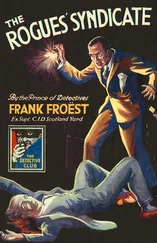'Down a bit.'
The scaffold sank. The operator navigated the depths with utmost caution, until a terrace-like protrusion showed up on the sonar. Without warning, a ridge appeared on the screen, so close it seemed almost in touching distance. Its surface was covered with wriggling bodies. Bohrmann stared at the eight monitors with a sinking feeling in his stomach. He was face to face with the nightmare that had haunted him since the collapse of the Norwegian slope. If the entire flank looked the same as the forty metres that the floodlights had wrested from the darkness, they could turn round and go home.
'Evil bastards,' growled Frost.
We're too late, thought Bohrmann.
Immediately he felt ashamed of himself for fearing the worst. No one could tell whether the worms had unloaded their cargo of bacteria or whether there'd be enough to do any real harm. Besides, there was still the unknown factor that had provided the final trigger. It wasn't too late. But they didn't have time to hang around.
'All right, then,' said Frost. 'Let's raise the unit and tilt it by forty-five degrees so we get a better view. And then it's time to lower the tube. I hope it's hungry.'
'Ravenous,' said van Maarten.
AT MAXIMUM EXTENSION, the suction tube stretched half a kilometre into the depths, a segmented, rubber-insulated monster, measuring three metres in diameter and culminating in a gaping mouth. Its opening was armoured with floodlights, two cameras and a number of swivelling propellers. From the Heerema , the end of the tube could be steered up and down, forwards, backwards and sideways. The monitor in the driver's cab combined footage from the lighting scaffold with images from the tube, providing a generous view of the overall picture. But although the visibility was good, operating the joysticks required sensitive fingers and a co-pilot to make sure that nothing was missed.
Time ticked by as the tube fell through the impenetrable darkness. Its floodlights were switched off. Then the lighting scaffold came into view. At first it was just a faint glimmer in the pitch-black water, then its glow intensified, taking on a rectangular form and finally sculpting the terrace out of the rock. It was so big that Bohrmann was reminded of a space station. The tube continued to sink, nearing the milling mass until the monitors were covered with writhing bristly worms.
There was a breathless silence in the control room.
'Amazing,' whispered van Maarten.
'A good cleaner doesn't stand about admiring the dirt,' Frost said grimly. 'It's about time you switched on your vacuum-cleaner and got rid of them.'
THE SUCTION TUBE was really a suction pump that created a vacuum, so that anything that passed before its mouth was swallowed inside. They threw the switch, but nothing happened. The pump evidently needed time to warm up – or that was what Bohrmann hoped. The worms went about their business uninterrupted. Disappointment swept round the room. No one said a word. Bohrmann fixed his eves on the two monitors displaying the tube. What was the problem? Was the tube too long? Or the pump too weak?
While he searched for an explanation, the picture changed. Something was tearing at the worms. Their bodies rose, then lifted vertically in the water, quivering frantically… They rushed towards the cameras and were gone.
'It's working!' Bohrmann shouted, and punched the air. He felt like dancing and turning cartwheels.
'Hallelujah!' Frost nodded vigorously. 'Oh, Lord, we're going to cleanse the world of evil. Sheesh!' He tore off his baseball cap, ran his hands through his hair and put the cap back on. 'Those critters won't know what's hit them.'
The worms were sucked into the tube so quickly and in such numbers that the picture faded to a flicker as sediment rose in swirls from the terrace.
'Further to the left,' said Bohrmann. 'Or the right. Doesn't matter which way, as long as you keep going.'
'Why don't we zigzag over the terrace?' suggested van Maarten. 'We could vacuum the floodlit zone from one end to the other. Then, once it's clear, we'll move the lights and the tube and start on the next forty metres.'
'Makes sense. Let's do it that way.'
The tube wandered over the terrace, pulling in worms as it went and causing such turbulence that the rock disappeared in clouds of sediment.
'We'll have to wait until the water settles to see what we've achieved,' said van Maarten, sounding relieved. He gave a deep sigh, and leaned back serenely. 'But my guess is that we'll all be pretty pleased.'
INDEPENDENCE, GREENLAND SEA
Dong! Trondheim church bells on a Sunday morning. The chapel in Kirkegata Street. Bathed in sunshine, the little steeple was stretched confidently into the sky, casting its shadow over the ochre-coloured house with its pitched roof and white steps.
Ding dong.
He buried his head in the pillow. As though church bells could dictate when it was time to get up. Fat chance! Had he been drinking last night? He must have been in town with some colleagues from the faculty.
Dong!
'OH-EIGHT HUNDRED HOURS.' The loudspeakers. The tranquillity of Kirkegata Street was gone. There was no steeple, no ochre-coloured house. Trondheim's bells weren't to blame for the noise in his head. He had an almighty headache.
Johanson opened his eyes and found himself lying amid rumpled sheets in a strange bed. Other beds were lined up around him, all empty. It was a big room, full of equipment, with no windows and a sterile appearance. A sickbay.
What the hell was he doing here?
His head lifted and fell back on to the pillows. His eyes closed of their own accord. Anything would be better than the hammering in his head. He was even feeling nauseous.
'OH-NINE HUNDRED HOURS.'
Johanson sat up. He was still in the same room. He felt significantly better, though. The queasiness was gone, and his head no longer felt as though it were being crushed in a vice. The pain had subsided to a tolerable ache.
He still didn't know what he was doing there.
He looked down at himself Shirt, trousers, socks – the clothes he'd been wearing last night. His down jacket and sweater lay on the next bed, with his shoes arranged neatly on the floor.
He swung his legs over the side of the bed.
A door opened and Sid Angeli, the head of the medical unit, came in. He was a small Italian with a thin circle of hair and deep creases round his mouth. He had the most tedious job on the ship since no one was ever ill. That seemed to have changed. 'How are you feeling?' Angeli cocked his head. 'Everything OK?'
I'm not sure.' Johanson touched the back of his head and flinched.
'It'll be sore for a while,' said Angeli. 'Don't worry, though – it could have been worse.'
'What happened?'
'You can't remember?'
Johanson thought hard. 'I could use a few aspirin.'
'But you don't know what happened?'
'No idea.'
Angeli came closer. 'Uh-huh. Well, you were found on the hangar deck in the middle of the night. You must have slipped. Thank God the ship is under video surveillance or you'd still be there. You probably hit your head on one of the struts.'
'On the hangar deck?'
'Yes. Don't you remember?'
Of course. He'd been on the hangar deck with Oliviera. Then a second time, by himself He could remember going back there, but he couldn't think why. And he had no recollection of what had happened next.
'It could have been really nasty,' said Angeli. 'You, er, hadn't been drinking, had you? I only ask because there was an empty bottle down there. Sue Oliviera said the two of you had cracked open some wine.' Angeli splayed his fingers. 'Don't get me wrong, Dottore, it's not a problem, but helicopter carriers are dangerous places. Wet and dark. It's easy to slip over or fall into the sea. It's better not to wander around on your own if you've, er…'
Читать дальше












